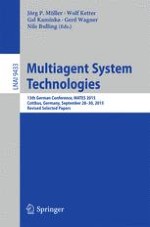2015 | Buch
Multiagent System Technologies
13th German Conference, MATES 2015, Cottbus, Germany, September 28 - 30, 2015, Revised Selected Papers
herausgegeben von: Jörg P. Müller, Wolf Ketter, Gal Kaminka, Gerd Wagner, Nils Bulling
Verlag: Springer International Publishing
Buchreihe : Lecture Notes in Computer Science
